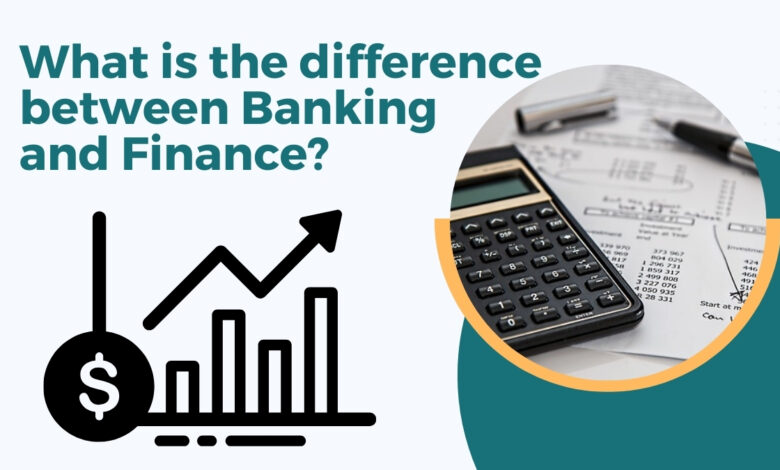What is the difference between Banking and Finance?

Banking and Finance? When it comes to managing money, two terms that often come up are banking and finance. They may seem similar at first, but they have important differences. Banking refers to institutions that hold your money and offer services like loans and savings accounts.
On the other hand, finance encompasses a wider range of activities, such as investments, risk management, and capital markets. Understanding these differences is important because it can help you make better financial decisions and be beneficial if you’re considering a career in the industry. Let’s explore what sets banking apart from finance and their distinct economic roles.
The Role of Banks in the Economy.
Banks play a vital role in the economy as intermediaries between savers and borrowers. By accepting deposits, banks provide a secure place for individuals and businesses to store their money. They then use these funds to provide loans, which fuel consumer spending and business expansion, ultimately promoting economic growth and stability.
Apart from lending, banks facilitate transactions through checking accounts and payment systems, which promote trade locally and internationally. In addition, banks offer various financial products to help individuals protect their assets against unexpected events. Furthermore, central banks regulate monetary policy by controlling interest rates and the money supply, influencing inflation rates and overall economic health, and guiding the direction of financial markets.
Types of Financial Institutions.
Financial institutions come in various forms, each serving distinct purposes. Perhaps the most familiar type is commercial banks. They accept deposits and offer loans to individuals and businesses, making them vital for daily transactions. Credit unions also play a unique role. These member-owned cooperatives focus on providing favourable rates and personalized services. Their community-oriented approach fosters trust among members.
Investment banks differ significantly from commercial banks. They specialize in underwriting securities and facilitating mergers or acquisitions, catering mainly to corporations rather than individual consumers. Insurance companies provide another layer of financial security by pooling risk through premiums paid by policyholders. This ensures that clients receive compensation in times of need.
Asset management firms help individuals and institutions manage investments effectively. By offering expertise in diverse markets, they aim to grow wealth over time while mitigating risks associated with investing.
Functions of Banks and Financial Institutions.
Banks and financial institutions play several important roles in the modern economy. They act as intermediaries between savers and borrowers, facilitating transactions that benefit both parties. One of their key functions is to accept deposits from individuals and businesses, which are then used to provide loans, thus stimulating economic growth by enabling investments in various sectors.
Additionally, banks offer payment services that simplify everyday transactions, including checking accounts, credit cards, and online banking tools that make money management more accessible. Risk management is another essential function, with financial institutions providing products like insurance and investment options to help individuals protect against unexpected events or losses.
They also play a vital role in implementing monetary policy by influencing interest rates through lending practices. This helps maintain stability within the broader economy while promoting sustainable growth.
Conclusion.
Understanding the difference between banking and finance is crucial for anyone navigating the financial landscape. Banks serve as intermediaries, facilitating transactions and providing services such as savings accounts, loans, and investment opportunities. They play a vital role in ensuring liquidity in the economy. On the other hand, finance encompasses a broader spectrum of activities that include investments, risk management, and asset allocation. It is not limited to banks but extends to various institutions such as credit unions, insurance companies, and investment firms.
The functions of these entities are interconnected yet distinct. While banks focus on deposit-taking and lending processes that support everyday consumers and businesses, financial institutions engage in more complex operations involving market analysis and capital growth strategies. Recognizing these differences can empower individuals to make informed decisions about their finances. Whether you’re considering where to open an account or how best to invest your money, understanding both sectors will guide you toward making better choices tailored to your needs.
